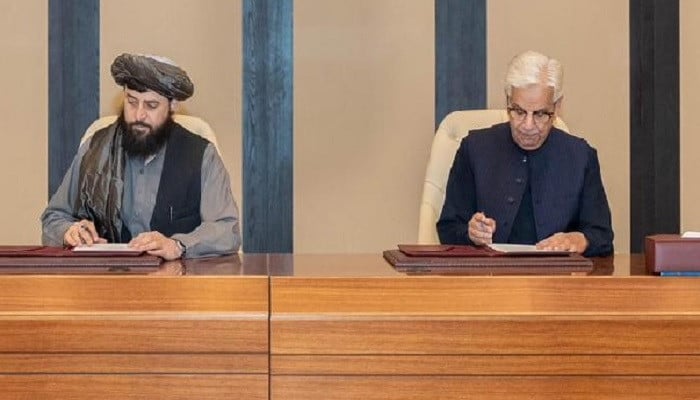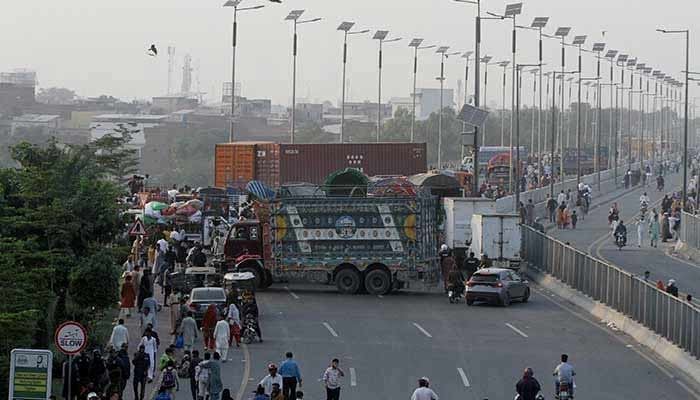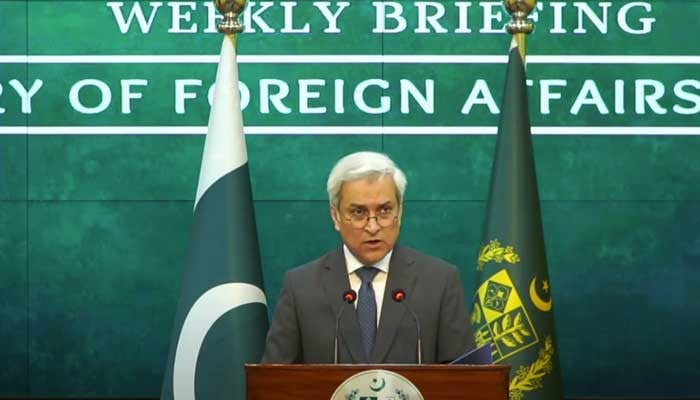
Defence Minister Khawaja Asif and his Afghan counterpart Mullah Yaqoob sign a ceasefire agreement in Doha, Qatar, on October 18, 2025. —X@MofaQatar_EN
#PakistanAfghanistan #ceasefire #agreed #Qatar #Turkiyes #mediation
Pakistan and Afghanistan have reached a historic ceasefire, the Foreign Ministry announced, marking what could be a major step towards restoring peace and stability along their long-standing border.
According to Qatari officials, the ceasefire agreement brokered by Qatar and Turkey is expected to lay a solid foundation for lasting peace in the region.
The two countries have also agreed to hold more meetings in the coming days and establish a permanent mechanism to ensure peace and stability between them.
“Both sides during negotiations [have] Read the statement issued by Qatar’s Ministry of Foreign Affairs.
“Both parties [have] It was also agreed to hold follow-up meetings in the coming days to ensure the stability of the ceasefire and verify its implementation in a credible and sustainable manner, thereby helping to achieve security and stability in both countries, he added.
Confirming the agreement, Defense Minister Khawaja Asif, who led Pakistan’s delegation in Doha, expressed hope that the ceasefire would end border tensions between the two countries.
Asif said delegations from both sides would meet again in Istanbul on October 25 as he stressed that the two countries had agreed to respect each other’s territorial sovereignty.
The defense czar added that under the agreement, terrorism from Afghanistan on Pakistani soil would immediately stop.
He also thanked Qatar and Turkey for mediating talks with Afghanistan.
Pakistan and Afghanistan held the first round of Qatar-mediated talks in Doha on Saturday. Defense Minister Khawaja Asif led the Pakistani delegation, while his Afghan counterpart Mullah Yaqoob headed his country’s negotiators.
Additionally, sources said that senior security officials along with the defense minister supported the talks. The Afghan intelligence chief was also part of the Kabul delegation.
Sources added that Pakistan told the Afghan delegation that the presence of militant groups in Afghanistan was “unacceptable”.
Meanwhile, Deputy Prime Minister and Foreign Minister Ishaq Dar called the ceasefire agreement “a first step in the right direction”.
“We look forward to establishing a solid and verifiable monitoring mechanism, to be hosted by Turkey at the next meeting, to address the threat of terrorism emanating from Afghan soil towards Pakistan. It is imperative that all efforts are made to prevent further loss of life,” DPM Dar said in a post on X.
‘Border Clashes, Pakistani Attack’
Against the backdrop of increasing terror attacks in Pakistan, the two neighboring countries are witnessing heightened tensions amid the Afghan Taliban government’s reluctance to act against the terror group.
Taliban forces and India-backed Tehreek-e-Talaban Pakistan (TTP), aka Fitna al-Kharj, resorted to an unprovoked attack on Pakistan on 12 October.
Pakistan’s armed forces gave a befitting response to the aggression, killing more than 200 Afghan Taliban and allied militants in self-defense. The army’s media wing, Inter-Services Public Relations (ISPR), said 23 soldiers accepted martyrdom in clashes with Taliban forces and terrorists.
Additionally, security forces also carried out “sanctuary strikes” in Afghanistan’s Kandahar province and the capital, Kabul, successfully destroying several strongholds in response to the recent offensive.
After the ceasefire, Prime Minister Shahbaz Sharif said that Pakistan was ready to negotiate with the Taliban government in Afghanistan on suitable terms.
Since the return of Taliban rule to Afghanistan in 2021, particularly in the bordering provinces of KP and Balochistan, the country has witnessed an increase in cross-border terrorist incidents.
The two countries share an unsecured border spanning nearly 2,2500 km with several crossing points, which are important as an important element of regional trade and a key element of relations between people on both sides of the divide.
However, the issue of terrorism remains an important issue for Pakistan, which has urged Afghanistan to prevent its territory from being attacked by groups like the banned TTP inside the former territory.
In a post under the Information Minister, Information Minister Atullah Tarar said that Pakistan had also carried out “security strikes” on confirmed camps of the Gal Bahadur group in the border areas of North and South Waziristan districts.
“In these health strikes, [a] At least [of] 60-70 Kharjis [terrorists] The minister said, and his leadership has been sent to hell based on confirmed intelligence reports.
Tarar also noted that militants affiliated to the Khawarij group operating from Afghanistan have attempted several terrorist attacks inside Pakistan, saying that all such attempts were effectively thwarted by the country’s security forces which responded effectively, killing 100 militants affiliated to the Khawarij group.



